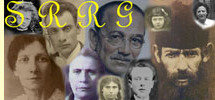



|
The Great Escape! Adolph left Czernovitz (a city he loved for its "cultural sophistication"). He worked there until he was "conscripted" into the Austrian army before WWI. As was possible in those days, he paid someone to take his place. That was the beginning of several bold decisions Adolph had to make to "escape" the country. Adolph and his younger brother, Shabse, were running away together, rather "swimming" away. It was probably their only option. They decided to escape by-way-of the Dniester river. One side was Austria, the other bank, Russia. The Austrian soldiers guarded the river day and night. The brothers planned a night escape. From childhood on, Adolph loved to swim--was self taught. He swam with his head above water, yet, apparently was quite proficient at the sport. He and Shabse began their swim; the soldiers, spotting them, began to shoot. Shabse was hit. Adolph made it across the river. I don't what happened to Shabse--whether he was killed, injured, and/survived. It's, regrettably, one of those lost pieces of history. The following is an excerpt from "Eastern European Jewish Emigration Via The Port Of Hamburg: 1880-1914"(1)
Adolph prepared for the next phase of his journey--travel by train to Bremen, Germany where he would board the ship. His maternal grandfather, Efraim Zuker-Reinstein already living in Toledo, Ohio, sent him the ticket. The next obstacle: Adolph didn't have a train ticket! Methodically, he thought through a plan that might work. Adolph sewed himself a fine looking suit and bought an appropriate dress hat. He purchased a newspaper to give himself an "aristocratic look", Adolph said. He understood the importance of having the "right clothes" and education that defined the upper class. Boarding the train, he sat down between two working-class men. The conductor came through the compartment. Adolph pulled his elegant hat down over his face and read the paper. The conductor asked the man sitting next to Adolph for his ticket, which he didn't have. The conductor threw him off. Adolph continued reading. The conductor passed him and asked the man on Adolph's other side for his ticket. When the man confessed he didn't have one, he was thrown off as well. The conductor continued collecting more tickets; Adolph read on; the train chugged on…carrying Adolph all the way to Bremen!
|
This page is hosted at no cost to the public by JewishGen, Inc., a non-profit corporation. If you feel there is a benefit to you in accessing this site, your JewishGen-erosity is appreciated.
© Copyright 2011 Suchostaw Region Research Group. All rights reserved.
Compiled by Susana Leistner Bloch and Edward Rosenbaum.
Back to SRRG Home Page | Jewish Gen Home Page | KehilaLinks Directory | Gesher Galicia | JewishGen Online Worldwide Burial Registry (JOWBR)
Last updated
02/27/2011 by ELR
Copyright © 2011 SRRG